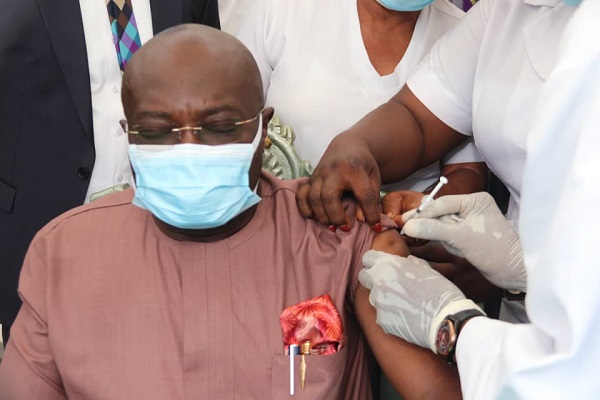COVID-19: Misinformation may affect vaccination – Yiaga Africa
The Yiaga Africa has expressed concerns over misinformation on the COVID-19 vaccination saying a steep misinformation curve is likely to affect community trust and vaccination confidence. This was contained in a policy brief on COVID-19 vaccine management in Nigeria released by the organisation on Wednesday in Abuja. ‘What Does Gumi Know about forests?’ – Masari […]

Gov. Ikpeazu of Abia State taking his covid-19 jab
The Yiaga Africa has expressed concerns over misinformation on the COVID-19 vaccination saying a steep misinformation curve is likely to affect community trust and vaccination confidence.
This was contained in a policy brief on COVID-19 vaccine management in Nigeria released by the organisation on Wednesday in Abuja.
- ‘What Does Gumi Know about forests?’ – Masari hits prominent cleric over banditry
We are coming after you, Air Chief warns bandits
It said that despite the Nigeria Centre for Disease Control (NCDC) developing a communication strategy to fight infodemic in a pandemic, misinformation about the vaccine was spreading fast, with some political and opinion leaders spreading ‘messages on woes’ negating the purpose of and need for the COVID-19 vaccination.
“This misinformation is also beginning to adopt a religious undertone, with some religious leaders projecting messages against the vaccine in a country where religion is a significant influencer.
“The federal government, through its agencies, must embark on public enlightenment providing adequate information on the vaccine and the importance of curbing the spread of COVID-19. The public enlightenment should also include readily available information on the process of vaccination, the phases of distribution, and the vaccination benefits in preventing COVD-19,” the report said.
The Yiaga Africa recommended that if the government in Nigeria and other African governments would succeed in vaccinating their populations against COVID-19, they must build people’s confidence in the government.
It said, “This is particularly so in Africa with very fragile health systems and infrastructure. With many governments now unable to ensure patient safety, fear of contracting COVID-19 reduces the number of people accessing local facilities resulting in an unprecedented crisis of confidence in the health system.”
